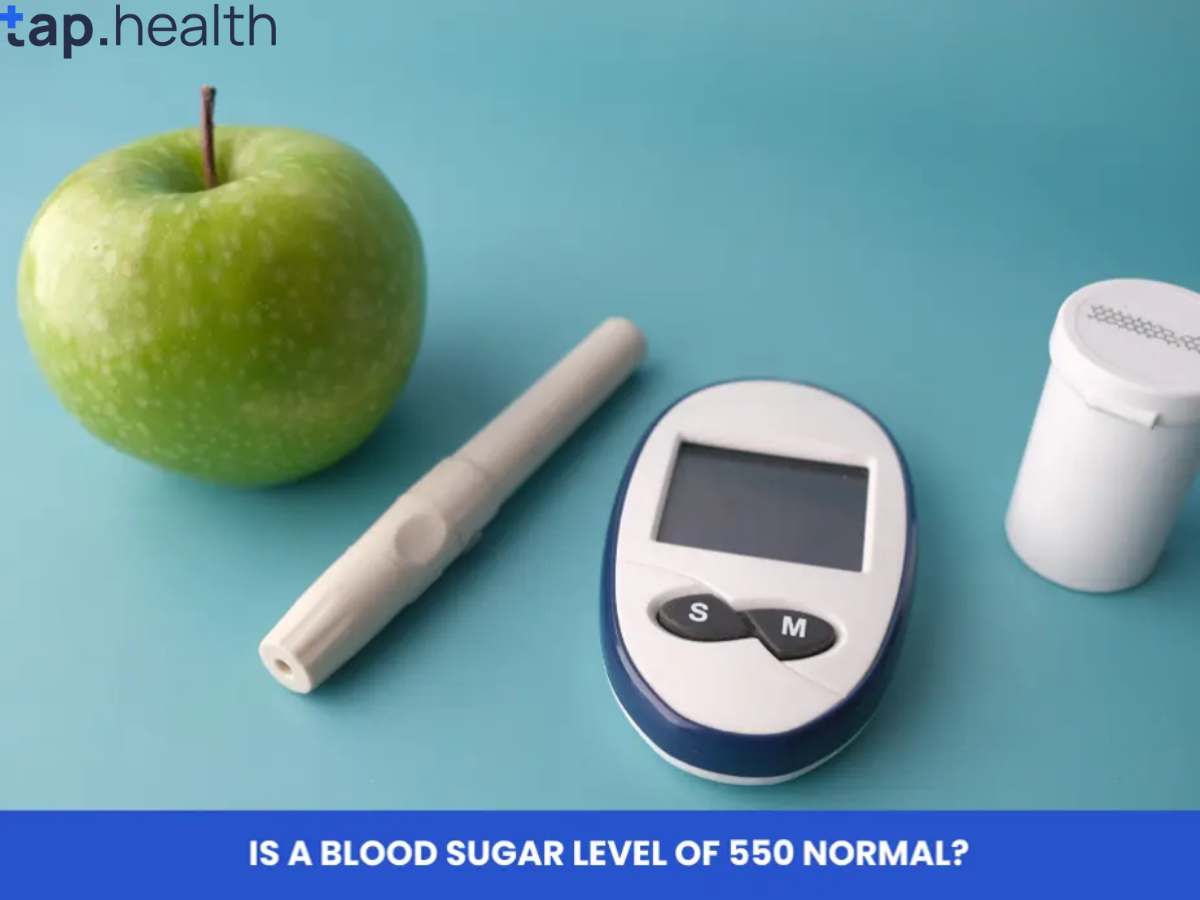Managing blood sugar levels is essential for maintaining good health, especially for individuals with diabetes. A question that often causes concern is, “Is 550 blood sugar normal?” In this comprehensive guide, we’ll delve deep into what blood sugar levels mean, the implications of a reading as high as 550 mg/dL, and the necessary steps to take if you encounter such a high number. We’ll break down complex information into simple terms, making it easy to understand for everyone, including those at an 8th-grade reading level.
What is Blood Sugar?
Blood sugar, also known as blood glucose, is the main type of sugar found in your blood. It comes from the food you eat and serves as the primary source of energy for your body’s cells. After you eat, your body breaks down carbohydrates into glucose, which enters your bloodstream. Insulin, a hormone produced by the pancreas, helps your cells absorb glucose to use for energy or store it for later use.
Maintaining blood sugar levels within a healthy range is crucial for your body’s proper functioning. When blood sugar levels are too high or too low, it can lead to serious health issues.
Understanding Blood Sugar Levels
Blood sugar levels are measured in milligrams per deciliter (mg/dL). Here’s a general guide to understanding these levels:
- Normal Fasting Blood Sugar: 70-100 mg/dL
- Pre-Diabetes: 100-125 mg/dL
- Diabetes: 126 mg/dL and above on two separate tests
- After Meals (Postprandial): Less than 180 mg/dL is considered normal. Levels higher than this may indicate hyperglycemia.
Understanding these ranges helps individuals monitor their health and take necessary actions to maintain optimal blood sugar levels.
The Role of Insulin
Insulin is a hormone that plays a pivotal role in regulating blood sugar levels. When you eat, your blood sugar rises, prompting the pancreas to release insulin. Insulin helps cells throughout your body absorb glucose from the blood, lowering blood sugar levels to a healthy range. In people with diabetes, this process is impaired, leading to elevated blood sugar levels.
Is 550 Blood Sugar Normal?
No, a blood sugar level of 550 mg/dL is not normal. Such a high reading indicates a severe state of hyperglycemia, which can be life-threatening if not addressed promptly. For context:
- Normal blood sugar levels are significantly lower, with fasting levels between 70-100 mg/dL.
- Levels above 180 mg/dL after meals are considered high.
- A reading of 550 mg/dL suggests a medical emergency that requires immediate attention.
Why 550 mg/dL is Dangerous
A blood sugar level of 550 mg/dL is alarmingly high and can lead to serious complications, including diabetic ketoacidosis (DKA) or hyperosmolar hyperglycemic state (HHS). Both conditions require urgent medical intervention.
Causes of Extremely High Blood Sugar
Several factors can contribute to exceptionally high blood sugar levels:
- Diabetes: Both Type 1 and Type 2 diabetes can cause elevated blood sugar levels if not properly managed.
- Insulin Resistance: The body’s inability to use insulin effectively can lead to high blood sugar.
- Infection or Illness: Stress from an infection or illness can increase blood sugar levels.
- Medication Non-Compliance: Missing insulin or diabetes medications can cause blood sugar to spike.
- Hormonal Changes: Conditions like Cushing’s syndrome can elevate blood glucose.
- Pancreatic Disorders: Diseases affecting the pancreas can disrupt insulin production.
- Stress: Physical or emotional stress can release hormones that raise blood sugar levels.
- Lifestyle Factors: Poor diet, lack of exercise, and excessive alcohol consumption can contribute to high blood sugar.
Understanding these causes is essential for preventing and managing extremely high blood sugar levels.
Symptoms of High Blood Sugar
Recognizing the signs of high blood sugar is vital for timely intervention. Common symptoms include:
- Frequent Urination: Excess sugar in the blood causes the kidneys to work harder to filter and absorb the excess glucose, leading to increased urination.
- Increased Thirst: Losing fluids through frequent urination can lead to dehydration.
- Fatigue: High blood sugar can affect the body’s ability to use glucose for energy, causing persistent tiredness.
- Blurred Vision: Elevated glucose levels can cause fluid to be pulled from tissues, including the lenses of the eyes, affecting vision.
- Headaches: Dehydration and metabolic changes can lead to persistent headaches.
- Nausea and Vomiting: Extremely high blood sugar can cause stomach discomfort.
- Shortness of Breath: A sign of diabetic ketoacidosis or other complications.
- Confusion: Severe hyperglycemia can affect brain function, leading to confusion or difficulty concentrating.
- Dry Mouth and Skin: Dehydration from excessive urination can cause dryness.
If you experience these symptoms, especially in combination, it’s essential to check your blood sugar levels and seek medical advice.
Risks Associated with High Blood Sugar
Persistently high blood sugar levels can lead to severe health complications, including:
- Diabetic Ketoacidosis (DKA): A serious condition where the body starts breaking down fats at an excessive rate, producing ketones, which can poison the body.
- Hyperosmolar Hyperglycemic State (HHS): Extremely high blood sugar levels without significant ketone production, leading to severe dehydration.
- Cardiovascular Disease: Increased risk of heart attacks, stroke, and hypertension.
- Nerve Damage (Neuropathy): High glucose levels can damage nerves, leading to pain and loss of sensation, particularly in the extremities.
- Kidney Damage (Nephropathy): Elevated blood sugar can impair kidney function, potentially leading to kidney failure.
- Eye Damage (Retinopathy): High blood sugar can damage the blood vessels in the retina, leading to vision loss or blindness.
- Foot Problems: Nerve damage and poor blood flow can lead to serious foot infections, sometimes resulting in amputations.
- Skin Conditions: People with high blood sugar are more susceptible to bacterial and fungal infections.
- Hearing Impairment: There is evidence linking high blood sugar levels with an increased risk of hearing loss.
- Alzheimer’s Disease: High blood sugar levels may increase the risk of developing Alzheimer’s disease and other forms of dementia.
Long-Term Complications
Chronic hyperglycemia can cause lasting damage to various organs and systems in the body. Managing blood sugar levels effectively is crucial to prevent these long-term complications.
Diagnosing Extremely High Blood Sugar
If you suspect that you have extremely high blood sugar, such as a reading of 550 mg/dL, it’s essential to seek medical attention immediately. Healthcare professionals will perform several tests to diagnose the severity of your condition:
- Blood Glucose Test: Measures the current level of glucose in your blood.
- HbA1c Test: Provides an average of your blood sugar levels over the past 2-3 months.
- Urine Tests: Check for the presence of ketones, which can indicate diabetic ketoacidosis.
- Electrolyte Tests: Assess the balance of minerals in your blood, which can be affected by high blood sugar.
- Blood Gas Tests: Measure the acidity of your blood, important in diagnosing DKA.
Early diagnosis and treatment are crucial to prevent severe complications associated with extremely high blood sugar levels.
What to Do if Your Blood Sugar is 550
If you or someone you know has a blood sugar reading of 550 mg/dL, immediate action is necessary:
- Seek Emergency Medical Help: Call emergency services or go to the nearest hospital immediately. Extremely high blood sugar can be life-threatening.
- Hydrate: Drink water to help flush excess sugar from your bloodstream. However, avoid sugary drinks that can further elevate blood sugar levels.
- Check for Ketones: If you have Type 1 diabetes, test your urine for ketones using a ketone strip. The presence of ketones indicates diabetic ketoacidosis, which requires urgent medical treatment.
- Follow Medical Advice: Once under medical care, follow the treatment plan prescribed by healthcare professionals. This may include:
- Insulin Therapy: Administering insulin to help lower blood sugar levels.
- Intravenous Fluids: To rehydrate and restore electrolyte balance.
- Electrolyte Replacement: To correct any imbalances in your blood minerals.
- Monitor Blood Sugar Levels: Keep a close eye on your blood sugar to prevent further spikes. Frequent monitoring can help manage your condition more effectively.
- Avoid Physical Activity: High blood sugar levels can make physical activity more challenging and may worsen symptoms.
- Rest: Allow your body to recover by getting plenty of rest.
Understanding the Emergency
Extremely high blood sugar levels can lead to a cascade of health issues, including organ damage, coma, and even death if not treated promptly. It’s crucial to recognize the severity of a 550 mg/dL reading and act swiftly to seek medical help.
Preventing Extremely High Blood Sugar Levels
Maintaining blood sugar within the recommended range is essential to avoid complications. Here are some strategies to help manage your blood sugar levels effectively:
- Healthy Diet:
- Balanced Meals: Include a mix of carbohydrates, proteins, and healthy fats.
- Limit Sugary Foods: Reduce intake of sweets, sugary beverages, and processed foods.
- Choose Whole Grains: Opt for whole grains over refined carbohydrates to maintain steady blood sugar levels.
- Fiber-Rich Foods: Incorporate vegetables, fruits, and legumes to help regulate blood sugar.
- Regular Exercise:
- Consistency is Key: Aim for at least 150 minutes of moderate aerobic activity each week.
- Types of Exercise: Activities like walking, cycling, swimming, and strength training can help lower blood sugar levels.
- Monitor Blood Sugar: Check your levels before and after exercise to understand how your body responds.
- Medication Adherence:
- Take Prescribed Medications: Follow your healthcare provider’s instructions for taking insulin or other diabetes medications.
- Never Skip Doses: Missing medications can lead to uncontrolled blood sugar levels.
- Understand Your Medications: Know how your medications work and their potential side effects.
- Monitor Blood Sugar:
- Regular Testing: Use a glucometer to check your blood sugar levels multiple times a day.
- Keep Records: Maintain a log of your readings to identify patterns and inform your treatment plan.
- Use Continuous Glucose Monitors (CGMs): These devices provide real-time blood sugar readings and alerts for high or low levels.
- Manage Stress:
- Stress Reduction Techniques: Practice meditation, yoga, deep breathing, or other relaxation methods.
- Adequate Sleep: Ensure you get 7-9 hours of quality sleep each night to help manage stress and blood sugar levels.
- Seek Support: Talk to friends, family, or a mental health professional if you’re feeling overwhelmed.
- Regular Check-Ups:
- Visit Your Healthcare Provider: Regular appointments can help monitor your condition and adjust treatments as needed.
- Screen for Complications: Early detection of issues like neuropathy or retinopathy can prevent severe complications.
- Stay Hydrated:
- Drink Plenty of Water: Staying hydrated helps your kidneys flush out excess sugar from your blood.
- Limit Dehydrating Beverages: Reduce intake of caffeine and alcohol, which can dehydrate you.
- Foot Care:
- Daily Inspections: Check your feet daily for cuts, blisters, or signs of infection.
- Proper Footwear: Wear comfortable shoes that fit well to prevent injuries.
- Seek Prompt Treatment: Address any foot problems immediately to prevent complications.
Creating a Routine
Establishing a daily routine that incorporates these strategies can help maintain stable blood sugar levels and reduce the risk of extremely high readings like 550 mg/dL.
Living with Diabetes: Long-Term Management
Managing diabetes is a lifelong commitment that involves more than just monitoring blood sugar levels. Here are some long-term strategies to effectively manage diabetes and prevent extremely high blood sugar levels:
- Education:
- Learn About Diabetes: Understanding the condition helps you make informed decisions about your health.
- Stay Informed: Keep up with the latest research and treatment options.
- Healthy Lifestyle Choices:
- Balanced Diet: Continue to prioritize a healthy diet rich in nutrients.
- Regular Exercise: Maintain an active lifestyle to help regulate blood sugar.
- Medication Management:
- Consistent Use: Take your medications as prescribed without missing doses.
- Regular Reviews: Periodically review your medications with your healthcare provider to ensure they’re still effective.
- Monitoring and Tracking:
- Use Technology: Utilize apps and devices that help track your blood sugar levels, diet, and exercise.
- Set Goals: Establish realistic health goals and work towards achieving them.
- Mental Health:
- Manage Stress: Chronic stress can affect blood sugar levels, so it’s important to find effective stress management techniques.
- Seek Support: Join support groups or seek counseling if you’re struggling with the emotional aspects of diabetes.
- Preventive Care:
- Regular Screenings: Schedule regular check-ups to monitor for complications.
- Vaccinations: Stay up-to-date with vaccinations to prevent infections that can raise blood sugar levels.
- Personalized Treatment Plans:
- Work with Healthcare Providers: Collaborate with your healthcare team to develop a treatment plan tailored to your needs.
- Adjust as Needed: Be open to adjusting your plan based on your body’s responses and changes in your health.
Empowerment Through Knowledge
Empowering yourself with knowledge about diabetes and its management can significantly improve your quality of life and reduce the risk of experiencing dangerously high blood sugar levels.
Frequently Asked Questions (FAQs)
1. Can blood sugar levels reach 550 mg/dL without diabetes?
While extremely high blood sugar levels like 550 mg/dL are most commonly associated with diabetes, certain medical conditions affecting the pancreas or hormonal imbalances can also cause elevated blood sugar levels. However, such high readings in individuals without diabetes are rare and usually indicate a serious underlying health issue that requires immediate medical attention.
2. What immediate symptoms should prompt me to check my blood sugar?
If you experience symptoms such as excessive thirst, frequent urination, extreme fatigue, blurred vision, nausea, vomiting, or confusion, it’s advisable to check your blood sugar levels promptly. These symptoms can indicate hyperglycemia and may require immediate action.
3. How often should I monitor my blood sugar levels?
The frequency of blood sugar monitoring varies depending on individual health conditions and treatment plans. People with Type 1 diabetes may need to check their blood sugar multiple times a day, while those with Type 2 diabetes might monitor less frequently. Always follow your healthcare provider’s recommendations regarding monitoring frequency.
4. Can diet alone control high blood sugar levels?
While a healthy diet is a crucial component of blood sugar management, it is often not sufficient on its own to control high blood sugar levels, especially in individuals with diabetes. Most people with diabetes require a combination of diet, exercise, and medication or insulin therapy to effectively manage their blood sugar levels.
5. What role does exercise play in managing blood sugar?
Regular physical activity helps your body use insulin more efficiently, lowers blood sugar levels, and improves overall health. Exercise can help reduce insulin resistance, allowing your cells to better absorb glucose from the blood. It’s important to monitor your blood sugar before and after exercise to understand how your body responds.
6. Is it possible to prevent blood sugar levels from reaching 550 mg/dL?
Yes, with proper management of diabetes or any underlying health conditions, it is possible to prevent blood sugar levels from reaching dangerously high levels like 550 mg/dL. This involves adhering to prescribed medications, maintaining a healthy diet, exercising regularly, monitoring blood sugar levels, and seeking timely medical attention when necessary.
7. What is the difference between diabetic ketoacidosis (DKA) and hyperosmolar hyperglycemic state (HHS)?
- Diabetic Ketoacidosis (DKA): Primarily occurs in Type 1 diabetes and is characterized by high blood sugar levels, ketone production, and metabolic acidosis. Symptoms include nausea, vomiting, abdominal pain, and rapid breathing.
- Hyperosmolar Hyperglycemic State (HHS): More common in Type 2 diabetes, HHS involves extremely high blood sugar levels and severe dehydration without significant ketone production. Symptoms include extreme thirst, frequent urination, confusion, and seizures.
Both conditions are medical emergencies that require immediate treatment.
8. Can high blood sugar levels cause long-term damage even if they are managed later?
Yes, prolonged periods of high blood sugar can cause irreversible damage to various organs and systems in the body. Even if blood sugar levels are managed later, some complications like nerve damage, kidney damage, or retinopathy may have already occurred. Therefore, preventing sustained hyperglycemia is crucial.
Conclusion
A blood sugar level of 550 mg/dL is not normal and signifies a medical emergency that requires immediate attention. Understanding the causes, symptoms, and risks associated with such high blood sugar levels is crucial for effective management and prevention. By maintaining a healthy lifestyle, adhering to prescribed treatments, regularly monitoring your blood sugar, and seeking timely medical help when necessary, you can significantly reduce the risk of experiencing dangerously high glucose levels.
Always consult with healthcare professionals for personalized advice and treatment plans tailored to your specific needs. Managing blood sugar is a multifaceted process that involves diet, exercise, medication, and continuous education. Empower yourself with knowledge and proactive health practices to maintain optimal blood sugar levels and overall well-being.



